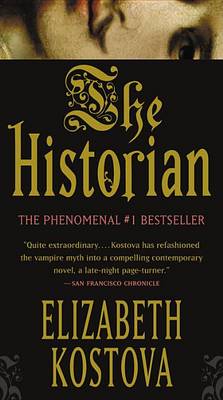
Late one night, exploring her father's library, a young woman finds an ancient book and a cache of yellowing letters addressed ominously to 'My dear and unfortunate successor'. Her discovery plunges her into a world she never dreamed of - a labyrinth where the secrets of her father's past and her mother's mysterious fate connect to an evil hidden in the depths of history. In those few quiet moments, she unwittingly assumes a quest she will discover is her birthright - a hunt for the truth about Vlad the Impaler, the medieval ruler whose barbarous reign formed the basis of the Dracula myth. Deciphering obscure signs and hidden texts, reading codes worked into the fabric of medieval monastic traditions, and evading terrifying adversaries, one woman comes ever closer to the secret of her own past and a confrontation with the very definition of evil. Elizabeth Kostova's debut novel is an adventure of monumental proportions - a captivating tale that blends fact and fantasy, history and the present with an assurance that is almost unbearably suspenseful - and utterly unforgettable.
What if Vlad Ţepeş, Prince of Wallachia and the inspiration for Bram Stoker's Dracula, really was a vampire? Elizabeth Kostova's The Historian explores this question, following three different characters: in the 1930s, Bartholomew Rossi, an English professor, in the 1950s, his protégé Paul, and in the 1970s, Paul's unnamed daughter. Mysterious books and Rossi's disappearance spark a hunt for Dracula's tomb that crisscrosses Europe and lets Kostova use a buttload of historical and geographical research.
Kostova brings Eastern Europe to life in a way I've never seen even attempted in fiction before. From cities such as Istanbul and Budapest, to tiny villages in Romania, the author describes the sights, sounds, people, politics, and culture with such intensity that I could picture it and suddenly had an extremely strong desire to see it all myself. Without this element, the book would have been much less interesting.
The plot is as intriguing as the setting; despite being spread out over 40 years, there's a sense of urgency coupled with extreme creepiness that drives the story forward. As the characters get closer to discovering Dracula's secrets, they're warned off in violent ways. The story moves between all three time periods effortlessly and clearly. It's a more cerebral DaVinci Code, and the author seems to champion using the past for guidance on how to handle the present.
The book's only weakness is its ending; without revealing much, all I could think was, "What? That's IT? THAT'S why?" It folds nicely into the historical themes, but seems to be at odds with the direness that propelled the plot. A brief explanation was given for this, but it just seemed lame. If anyone wants to counter on me this, I welcome it, since I'm dying to find reasons to consider the ending just as wonderful as the rest of the book.
Heartily recommended.
Reading updates
-
Started reading
-
1 January, 2007:
Finished reading
-
1 January, 2007:
Reviewed
